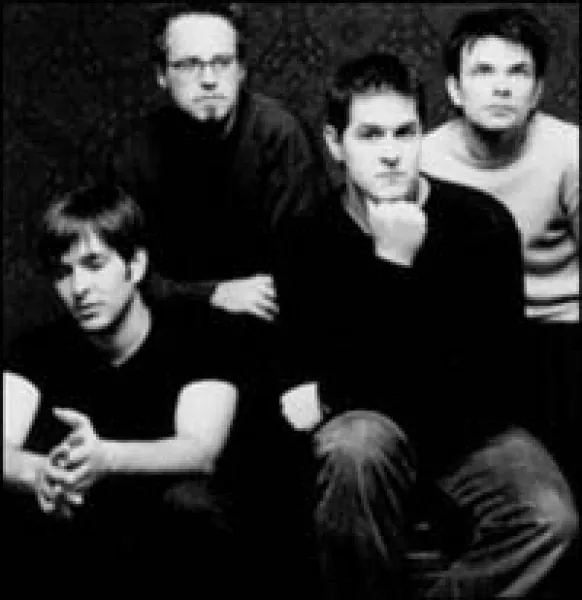
Jars Of Clay
Top Jars Of Clay albums
Top Jars Of Clay lyrics
Amazing Grace (Not Final Master)
Jars Of ClayJars Of Clay biography
Jars of Clay were the breakout band of the so-called alternative CCM movement of the '90s, scoring an enormous mainstream hit with their debut single, "Flood." The group's lyrics may have been exclusively Christian, but their mostly acoustic music fit perfectly into the folky jangle pop wing of alternative rock radio, at the time a rarity on the contemporary Christian music scene. Not only did their success set the stage for breakthroughs by Christian bands like dc Talk and Sixpence None the Richer, but it's also difficult to imagine the later popularity of heavier, Christian-themed hard rockers like Creed and P.O.D. without Jars of Clay having established the viability of fusing spiritual themes with mainstream alternative rock sounds. As popular tastes shifted, Jars of Clay found it increasingly difficult to maintain their secular audience, but still commanded a sizable following among Christian youth and remained one of the highest-profile groups in any gospel-music subgenre. br /br /Jars of Clay were formed at Illinois' Greenville College in 1993 by singer/songwriter Dan Haseltine and keyboardist Charlie Lowell; they soon added guitarist Stephen Mason, who like Haseltine, was a big fan of Toad the Wet Sprocket (a good secular reference point for the typical Jars of Clay sound). All three were music majors in the college's new CCM department, and at first played together just for fun, writing a song for a cla** recording project. Eventually, they chose a name for the band from a verse in the second book of Corinthians, which emphasized the frailty of the physical vessels in which God had placed the human spirit. Second guitarist Matt Bronleewe joined up later, and drummer Scott Savage became part of the band's live lineup, though they continued to use electronic drum loops on some of their recordings. Encouraged by the response to their small repertoire of originals, the band entered a talent competition run by the Gospel Music Association in 1994. Chosen as finalists on the strength of their demo tape, the band traveled to Nashville to perform for industry executives, and wound up winning the contest. They returned to Greenville and began selling a self-released demo CD called Frail, and record companies were soon calling the group's dorm hoping to sign them. With such intense interest, the band decided to leave school and relocate to Nashville permanently; at this point, Bronleewe departed, wanting to finish school and settle down with his fiancee, and was replaced by Lowell's childhood friend Matt Odmark.br /br /After considering several offers, Jars of Clay signed with the smaller Essential label, which nonetheless had ample distribution power through its parent company Brentwood's arrangement with the secular label Silvertone. As the group was recording its self-titled debut album, Frail caught the ear of prog rock guitarist and recent Christian convert Adrian Belew, who offered to produce a couple of tracks for the record. One of those songs was "Flood," which became a runaway hit on Christian radio when the album was released in the spring of 1995. When "Flood" began to catch on with secular stations (particularly in the Northwest), Silvertone threw its full promotional muscle behind the album, and by early 1996, the song was a major crossover hit on mainstream rock radio, modern rock radio, and the pop charts (its peak of number 37 on the latter makes it one of many '90s-era hits whose release formats affected its chart eligibility, thus obscuring how ma**ively popular it really was). "Flood" helped push sales of Jars of Clay past the double-platinum mark, a stunning showing for a Christian group.br /br /Some secular listeners and radio programmers hadn't realized that Jars of Clay were a Christian band, and there was something of a backlash when that fact became more widely publicized. What was more, they were criticized in some Christian quarters for touring with secular alternative rock bands during 1996. They spent most of the year on the road, then took a break to work on material for their second album (they'd already released the Christmas EP Little Drummer Boy at the end of 1995). Signing on with British producer Steve Lipson, Jars of Clay released Much Afraid in 1997. The record debuted in the Top Ten on the pop charts and not only went platinum, but won a Grammy for Best Pop/Contemporary Gospel Album. Yet, despite some success with the singles "Five Candles" and "Crazy Times," Much Afraid didn't gain the same level of mainstream exposure as its predecessor. Nonetheless, their Christian audience remained loyal, sending their 1999 follow-up, If I Left the Zoo, to gold sales; the record was produced by Dennis Herring, who'd also worked with Counting Crows. By this time, Savage had left the band's concert lineup to back Jaci Velasquez, and was replaced by Joe Porter. Jars of Clay self-produced their fourth album, The Eleventh Hour, which was released in early 2002 and followed by a live DVD. br /br /The next year, the band issued the impressive double-disc set Furthermore: From the Studio/From the Stage. This album highlighted fresh, acoustic-driven cla**ics as well as cuts from some of Jars of Clay's intoxicating live shows. In November 2003, the group released their fifth album proper, Who We Are Instead. Comprised of the band's take on significant church hymns and popular spirituals, Redemption Songs followed in early 2005. Jars of Clay returned in fall 2006 with Good Monsters and supported their seventh effort on the road with Matt Wertz and ex-Sixpence None the Richer frontwoman Leigh Nash opening. ~ Steve Huey, All Music Guide

